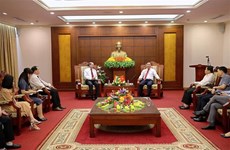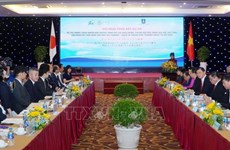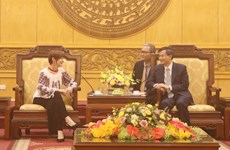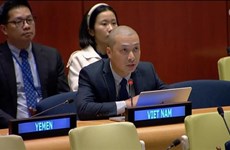Vietnam affirms stance of people-centred national development
Vietnam has reiterated its consistent
policy considering human factor the driving force and the ultimate goal
of its national development at a UN meeting on human security.
Vietnam has reiterated its consistent
policy considering human factor the driving force and the ultimate goal
of its national development at a UN meeting on human security.
“Vietnam has been doing its utmost to ensure effective implementation of adopted people-centered policies and strategies,” Ambassador Bui The Giang, Deputy Permanent Representative of Vietnam, said at the General Assembly Plenary Meeting on Human Security in New York on May 20-21.
Ambassador Giang noted that Vietnam’s efforts over the years and subsequent encouraging results in implementing the MDGs, reducing poverty and improving both the material and spiritual living standards for the population are nothing else but the practical application of the human security concept to strategy and policy priorities in the country’s specific circumstances and conditions.
“We look forward to greater cooperation, assistance and partnership from the international community, the United Nations system in particular, in dealing with the current and emerging threats and challenges Vietnam is confronting, especially those posed by climate change, the spread of HIV/AIDS, and trafficking in persons,” he said, adding that Vietnam is willing to join initiatives and contribute to endevours along this line.
The Vietnamese diplomat also welcomed discussions on human security, especially in the context of increasing traditional and non-traditional security threats.
The discussions will better understanding about this concept, its relationship with non-traditional insecurities, possible responses to those non-traditional insecurities, and application of the human security concept in multilateral diplomacy, particularly through the UN’s activities, he said.
While affirming the State’s primary responsibility for ensuring the survival, livelihood and dignity of its individual citizens and communities, Ambassador Giang noted that human security does not entail the use of force against the sovereignty of States but rather focuses on fostering government and local capacities and strengthening the resilience of both to emerging challenges.
He was quick to add that in today’s globalised world, international cooperation, assistance and partnership are indispensable. Furthermore, such cooperation, assistance and partnership can only be most effective when and if taking into account specific social, economic, political, historical and cultural conditions, respecting the ownership of local stakeholders, and complying with the principles of international laws and the United Nations Charter, he said.
Giang affirmed Vietnam’s stance that the UN’s focused attention should be paid to hunger eradication, poverty alleviation and socio-economic development as hunger, poverty and underdevelopment represent the root causes of the many threats and challenges, both traditional and non-traditional, as well as are the very areas where the UN, with its vast and diverse experience and expertise, can make best contribution./.
“Vietnam has been doing its utmost to ensure effective implementation of adopted people-centered policies and strategies,” Ambassador Bui The Giang, Deputy Permanent Representative of Vietnam, said at the General Assembly Plenary Meeting on Human Security in New York on May 20-21.
Ambassador Giang noted that Vietnam’s efforts over the years and subsequent encouraging results in implementing the MDGs, reducing poverty and improving both the material and spiritual living standards for the population are nothing else but the practical application of the human security concept to strategy and policy priorities in the country’s specific circumstances and conditions.
“We look forward to greater cooperation, assistance and partnership from the international community, the United Nations system in particular, in dealing with the current and emerging threats and challenges Vietnam is confronting, especially those posed by climate change, the spread of HIV/AIDS, and trafficking in persons,” he said, adding that Vietnam is willing to join initiatives and contribute to endevours along this line.
The Vietnamese diplomat also welcomed discussions on human security, especially in the context of increasing traditional and non-traditional security threats.
The discussions will better understanding about this concept, its relationship with non-traditional insecurities, possible responses to those non-traditional insecurities, and application of the human security concept in multilateral diplomacy, particularly through the UN’s activities, he said.
While affirming the State’s primary responsibility for ensuring the survival, livelihood and dignity of its individual citizens and communities, Ambassador Giang noted that human security does not entail the use of force against the sovereignty of States but rather focuses on fostering government and local capacities and strengthening the resilience of both to emerging challenges.
He was quick to add that in today’s globalised world, international cooperation, assistance and partnership are indispensable. Furthermore, such cooperation, assistance and partnership can only be most effective when and if taking into account specific social, economic, political, historical and cultural conditions, respecting the ownership of local stakeholders, and complying with the principles of international laws and the United Nations Charter, he said.
Giang affirmed Vietnam’s stance that the UN’s focused attention should be paid to hunger eradication, poverty alleviation and socio-economic development as hunger, poverty and underdevelopment represent the root causes of the many threats and challenges, both traditional and non-traditional, as well as are the very areas where the UN, with its vast and diverse experience and expertise, can make best contribution./.













